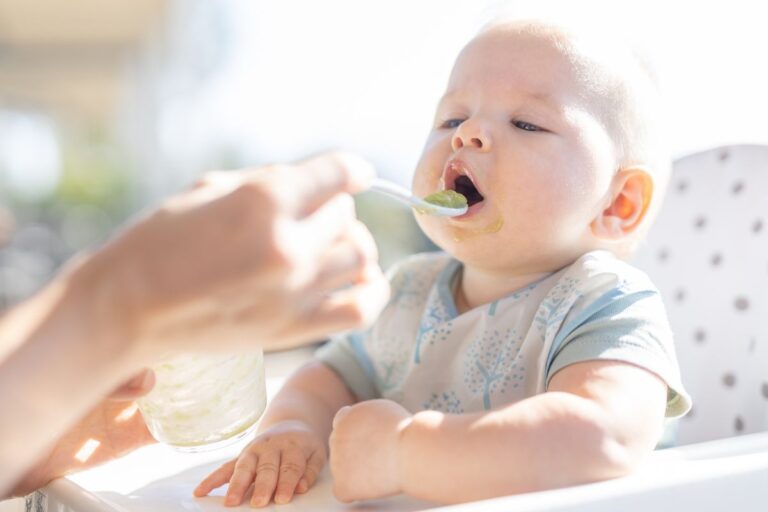The Truth About Adding Cereal to Baby's Bottles
There are a lot of myths out there about baby sleep. As an infant sleep expert and postpartum doula, I pride myself on educating families about safe sleep as well as debunking any harmful myths. The misconception is that by adding cereal to baby’s bottle it will fill their tummies and help them sleep longer. Not only is this not true, but it also can be harmful to your baby and create other issues.

When and How to Introduce Solids
Breastmilk and/or formula are the main source of nutrition for babies up until 12 months of age. Most full-term, healthy babies are ready for solids around 6 months, as their nutrient needs start to exceed what breastmilk or formula alone can provide. But breastmilk and/or formula still remain an important source of calories for your baby and should be offered first.
In addition to the age of your baby, there are other developmental signs of readiness. Some of these signs include: if your baby can sit with limited support, hold their head up strong and steady, reach and grab things to bring to their mouth as well as showing an interest in eating.
There is no right or wrong way to introduce solids. Some families decide to skip spoon feeding and go right to baby led weaning, some do a mix of both. If you want to introduce baby cereal, it can be spoon fed to your baby which helps control how much they eat and is a great source of carbohydrates, iron, zinc and other nutrients. Vegetable and fruit purees are also a great way to introduce one solid food at a time.
Understanding Sleep and Nutrition
A baby’s ability to sleep long stretches at night (as well as sleep through the night) is not about how full their tummy is, but rather their ability to self soothe as well as their developmental stage. I always recommend ensuring that baby gets a full feeding before bed, but that’s regardless of whether baby is 3 months old or 12 months old.
The notion that adding cereal to the baby’s bottle will make them magically sleep through the night is simply not true. There is no evidence that it will help your baby sleep better at night. In fact, some babies sleep worse because of the risk factors of adding cereal to a bottle or introducing solids too soon.
The Risks of Early Introduction of Solids
Introducing solids too early along with adding cereal to baby’s bottle, poses these potential risks for your baby:
- Immature Digestive System: Babies are typically not ready for solids until around 6 months of age. Their digestive systems are still developing, and early introduction can lead to discomfort and an increased risk of food allergies. It can also cause a change in stool consistency, resulting in constipation.
- Choking Hazard: Cereal thickens the bottle’s contents, posing a choking risk.
- Aspiration: This is caused when liquids or solids get trapped in baby’s lungs. There’s a higher risk of aspirating the thickened milk.
- Nutritional Imbalance: Exclusive breastfeeding or formula feeding is recommended for the first 6 months. Adding cereal can disrupt the balance of essential nutrients. The cereal adds carbohydrates and dilutes the nutrient density.
- Overfeeding: Adding cereal to a bottle will cause your baby to take in extra calories that aren’t needed, especially at nighttime.
Caloric Considerations
As mentioned above, adding cereal can shift the balance of nutrients your baby is getting. Adding one tablespoon of baby cereal to a bottle adds about 57.2 calories. This slight increase in calories is unlikely to significantly affect a baby’s sleep duration. Sleep quality and duration are influenced more by sleep habits and developmental stages than by a small increase in caloric intake.

Doctor Recommendations
On top of all of these risks, The American Academy of Pediatrics recommends against the use of rice cereal in bottles to improve sleep patterns. However, in my 4+ years working with babies there have been many times that a family has been told by their pediatrician to add cereal to the bottle due to reflux symptoms.
If your pediatrician has suggested this in order to thicken the feeding because of your baby’s reflux, consider asking about alternatives. Mention to them your concerns with the risk factors stated above along with the AAP’s recommendations. You want to make sure you have all the facts before taking any action that may harm your baby.
The Underlying Issue: Sleep Props
If your baby isn’t giving you long stretches of sleep or sleeping through the night, I urge you to consider other factors besides hunger. Is your baby developmentally able to sleep through the night? Babies should be at least 3 months old or weigh 15 pounds before you can expect them to consistently sleep through the night. Of course there’s always an exception to this rule.
How often is your baby waking up and what are they needing at each wake up? Most often, the issue with a baby’s sleep is their reliance on sleep props to fall asleep. A sleep prop is anything external that gets them to sleep, such as feeding or rocking. So when your baby wakes up in the night they are requiring a rocking or a feeding even if they’re truly not hungry. They are just needing help in getting back to sleep. Teaching babies to fall asleep independently, without sleep props, is key to helping them sleep through the night (when developmentally ready) or reduce overall night wakings.
My Recommendation
Despite this popular myth, there’s overwhelming evidence against adding cereal to a baby’s bedtime bottle. It doesn’t contribute to longer sleep and the risks heavily outweigh any potential benefits.
Nurturing good sleep habits and teaching your baby to self-soothe are far more effective for healthy sleep patterns. Always consult with a pediatrician before changing your baby’s diet or sleep routine.
Remember, each baby is unique and may have different needs. Resist the urge to compare your baby to your friend, sister or neighbor’s babies who’ve been sleeping through the night for months! If you find yourself struggling with your baby’s sleep, solids or cereal are not the answer. Let me help you work on independent sleep, a much more sustainable and smarter choice. Book your free call today.

